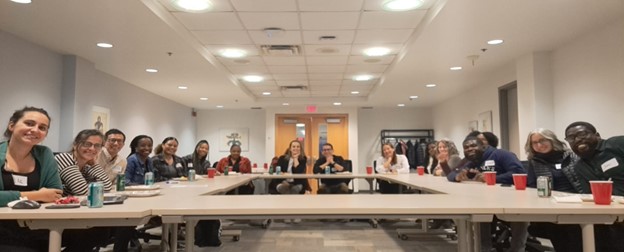
This summer, 18 Black undergraduate students from three units in the Faculty of Health (Psychology, Global Health and Kinesiology) will participate in work-integrated learning opportunities across six health-sector organizations, where they will support diverse programs, services, research and other organizational priorities.
Funded by a Co-operative Education and Work-Integrated Learning (CEWIL) Canada iHub grant, this initiative helps students gain real-world experience in their field of interest and develop knowledge and skills to support their academic and professional journeys. It is uniquely positioned to address notable gaps in representation among Black professionals in the health sector – a vision that is shared by the placement organizations. “These future leaders will be poised to improve research and service delivery for Black communities overall,” said Monique Herbert, associate professor of psychology.
Integrating culturally relevant training
Before students set off on their placements, they participated in preparatory workshops focused on skill-building for a successful experience. A highlight of this process was a workshop with a special focus on navigating the workplace as a Black individual, which was developed and conducted by two guest facilitators, Karlyn Percil-Mercieca of KDPM Consulting Group and York alum Shereen Ashman of SACCAE Social Innovation Studio.
“The presenters applied a holistic lens to the discussion of professionalism skills, allowing both culture and race to infuse the conversation in a meaningful and tangible way. Grounding ‘professionalism’ in this context allows students to adopt a strength-based approach to their field placements,” said Paola Calderon-Valdivia, experiential education co-ordinator, Faculty of Health.
“Students were encouraged to draw wisdom from their lived experiences, to embrace their collective truth and to rely on their racial heritage as a source of empowerment – reminding them of their inherent value and the meaningful contributions they would be making to their host organizations; a message that was well received by the students.”
It is this type of culturally relevant training that is very much needed because representation matters, added Herbert. “Seeing, hearing and learning from someone who looks like you makes it more tangible, more achievable. We need more of this; it empowers our students,” said Herbert.
Focusing on a well-rounded support system for students
During their 100-hour placement in a health-related setting, students will be supervised by a placement supervisor and benefit from networking and relationship-building opportunities with health professionals and mentors in the field. Alongside work experience, students will receive academic oversight and learning guidance from volunteer faculty advisors from each unit. Calderon-Valdivia will offer ongoing support, guidance and troubleshooting to students, faculty and placement organizations. Three student mentors who previously participated in the initiative will also offer peer-informed support to students throughout the experience.
A further source of support for students will be a stipend offered through the CEWIL iHub grant, which will offset any associated costs for their participation in the initiative, such as transportation, time away from jobs and more. This aligns with the University Academic Plan in providing experiential learning opportunities and offering supports for students who face systemic barriers.
Building on the legacy of student-led advocacy
Black student advocacy around systemic barriers led to the development of the Summer 2022 pilot phase of this initiative in the Department of Psychology. Two Black student-led groups (Black Students in Psychology and the Black Students Mentorship Program) with missions to address the lack of representation of Black professionals and academics in health-related fields spearheaded a collaboration between the Department of Psychology and the experiential education (EE) team in the Faculty of Health, led by Anda Petro.

Psychology students who participated in the pilot praise the program for offering hands-on experience beyond the traditional classroom and the opportunity to grow personally and professionally.
“…it provided me with a chance to step outside of my comfort zone and grow as an individual, student and professional," said Nichol Edwards Snagg, psychology undergraduate student. "Throughout my placement, I developed and strengthened my initiative, group facilitation and communication skills, all while contributing to a project that benefitted the Black community.”
The success of this initiative and future initiatives is contingent on having a strong support system and funding, said Herbert.
“We are grateful to the EE staff, faculty and student mentors in the Faculty of Health and CEWIL for their support; this initiative would not have been possible without them. These experiences are invaluable for our Black students, and we hope that there will be further funding opportunities to continue this important work,” said Herbert.
